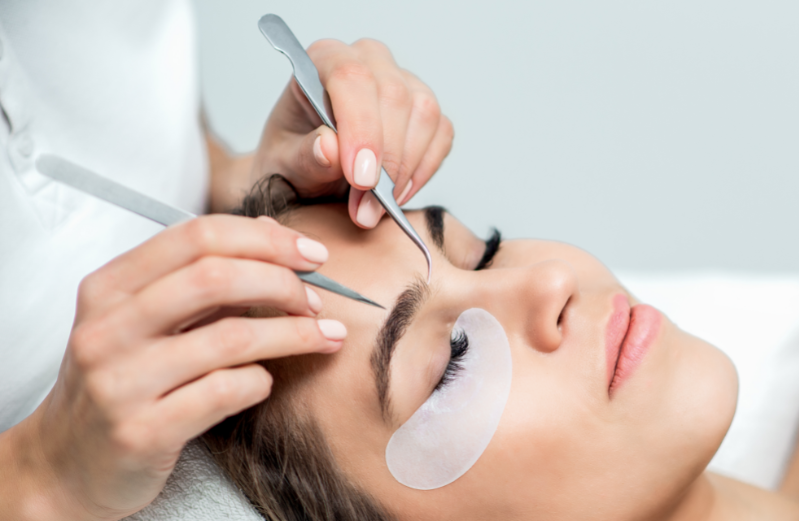Eyelash extensions have become more popular than traditional makeup techniques like mascara and eyeliner. Unlike these conventional methods, eyelash extensions will give your beautiful eyes a more natural and perfect appearance. Moreover, eyelash extensions are customizable and last a long time. Unfortunately, eyelash extensions can cause undesirable allergic reactions in some people. Whether you are a professional eyelash extension artist or a client, learning about eyelash extension allergic reactions can make a difference. This article will discuss eyelash extension allergic reactions, including what the allergen might be and the symptoms to watch out for.
Can You be Allergic to Eyelash Extensions?
While allergic reactions to eyelash extensions are uncommon, they do happen sometimes. The allergic reaction can manifest itself in one or both of your eyes. If it occurs in both eyes, it tends to be more severe in one eye. Symptoms usually appear after a few minutes or hours after the application. In most cases, the allergic reaction is triggered by the fumes released by the adhesive.

What's the Difference Between Eyelash Extension Allergy and Irritation?
It is essential to differentiate between eyelash extension allergy and irritation. This way, you will be able to seek the best treatment. Even though most people associate eyelash irritation with allergic reactions, they are more likely to experience irritation. Irritation to eyelash extensions is more common and typically appears within the first day after the application. Irritation is usually characterized by watery eyes, itching, and redness.
On the other hand, allergic reactions to lash extensions occur within the first 48 hours after application. Typical symptoms include itchiness, swollen eyes, and redness of the cornea.
What Causes Eyelash Extension Allergic Reactions?
Allergic reactions to eyelash extensions are similar to other contact allergies, also known as contact dermatitis. These types of allergies occur when the skin comes into contact with irritating substances such as chemicals and heat. Allergic reactions to eyelash extensions usually result from the adhesive.
In fact, a study conducted in 2012 proved that the adhesive used to attach the extensions causes allergic reactions to the eyes and eyelids. The study also determined that different chemical compounds in the adhesive cause an allergic reaction. One such compound is formaldehyde which causes keratoconjunctivitis. Another compound known as benzoic acid may also cause an allergic reaction in people allergic to lead. Other causes of eyelash extension adhesive allergies include latex, carbon black, and cyanoacrylate.
It is also essential to note that allergic reactions might occur due to other foreign allergens such as smoke, pollution, perfume, or pollen.
Symptoms of Eyelash Extension Allergic Reactions
Knowing the symptoms of lash extension allergic reactions can help you seek immediate treatment before things get out of hand. A 2019 study revealed that blepharitis is the most common symptom of eyelash extension allergies.
Blepharitis is an inflammation that occurs on the eyelids or the base of the eyelashes. The condition is characterized by the stickiness of the eyelids and redness. You will also likely notice itchiness, irritation, redness, and tearing on one or both of your eyes. It might manifest itself after a few hours or days after the procedure.
Apart from the eyelids, symptoms might also occur in the eyes. Typical symptoms include:
Watery eyes
Irritation
Redness
Itchiness
Depending on the severity and treatment, these symptoms may last from a few hours to a few days.

How to Treat Eyelash Extension Allergic Reactions at Home?
Some of the proven ways of treating eyelash extension allergic reactions at home include:
Applying eye drops
Using a cold compress or icepack
Taking antihistamines
Using hydrocortisone creams or ointments
Also, avoid rubbing your eyes since you might damage the cornea or the eye lenses. This may lead to an infection or vision impairment. Additionally, seek immediate medical attention if the symptoms persist. A qualified doctor will be able to assess the cause of the reaction and provide the best treatment.
How to Prevent Eyelash Extension Allergic Reactions
Prevention is better than cure. That's why working with a licensed eyelash extension artist is essential. A licensed eyelash extension artist has the tools and expertise to apply the extension safely. In addition, licensed artists will ask you questions to know whether you are allergic to any compound in the adhesive. Also, take your time to check the hygiene levels in the studio or salon. During the procedure, remember to keep your eyes closed to prevent the glue from getting into your eyes.
Find the Best Lash Training Center Near You
.As a professional lash extension artist, staying ahead of current trends and recognizing warning signs of eyelash extension allergic reactions is essential. This way, you will be able to keep your clients safe. Although giving your customers medical advice is not advisable, learning how to handle sensitive skin will help you protect your clients. If you are looking for top-rated lash trainers, don't hesitate to check the Lash Training Center. Anna Shirokova, one of the instructors in Lash Training Center, has been featured on SDVoyager as one of the best pros in the industry.



Comments